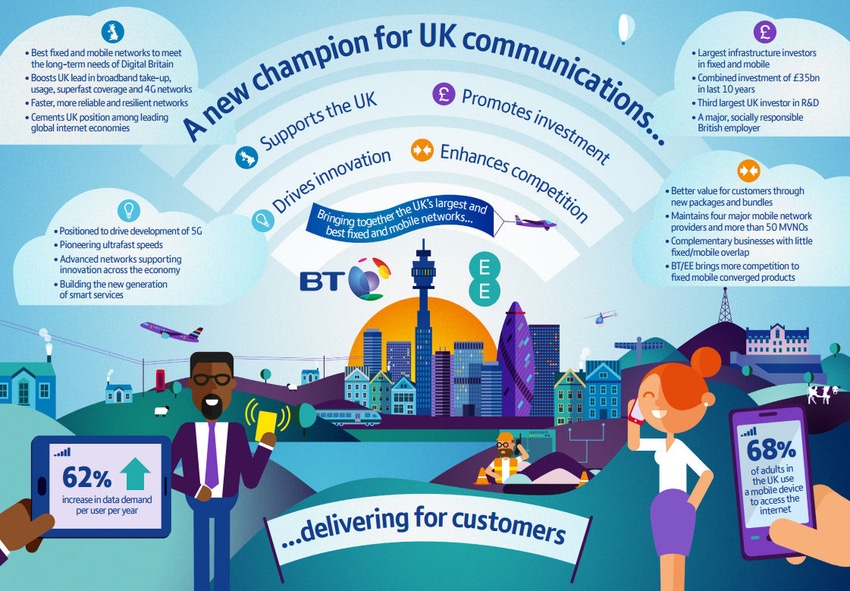The UK competition authority has provisionally approved the acquisition of mobile operator EE by fixed-line giant BT, which will create the country’s dominant communications provider.
October 28, 2015

The UK competition authority has provisionally approved the acquisition of mobile operator EE by fixed-line giant BT, which will create the country’s dominant communications provider.
Given that EE is the number one mobile operator by subscriptions and BT is the dominant fixed-line player, there was a distinct possibility that a number of strings would be attached to the approval. But having weighed up all the pros and cons, the CMA doesn’t seem to think there are any competition concerns at all. It will now field responses to this provisional finding and deliver its final report by 18 January 2016.
“We recognise that this is a merger which is important to many consumers and businesses,” said Inquiry Chair John Wooton. “We have heard a number of concerns from competitors. After a detailed investigation, our provisional view is that these concerns will not translate into a competition problem in practice.
The main reason for this laissez-faire attitude is the complementary nature of their respective businesses, with BT weak in mobile and EE weak in fixed. Wooton also reckons the potential for BTEE to disadvantage wholesale broadband or MVNO companies is limited. “Having considered all the evidence, the group does not provisionally believe that, in a dynamic and evolving sector, it is more likely than not that BT/EE will be able to use its position to damage competition or the interests of consumers,” was Wooton’s somewhat convoluted conclusion.
The powers that be at the respective companies are, of course, pleased. “We’re pleased that the CMA has provisionally approved BT’s acquisition of EE,” said BT Group CEO Gavin Patterson. “The combined BT and EE will be good for the UK, providing investment and ensuring consumers and businesses can benefit from further innovation in a highly competitive market.”
“EE welcomes the CMA’s provisional approval of our merger with BT,” said Olaf Swantee, CEO of EE. “We now look forward to completing the deal quickly, and creating a new combined company designed to benefit both British consumers and businesses, while helping to propel the UK to the very front of global telecommunications.”
Analysts also see this as a pretty much unqualified positive for EE. “The announcement that no remedies will be applied represents a particular victory for the company,” said Kester Mann of CCS Insight. “Rivals such as Sky, Vodafone and TalkTalk have repeatedly expressed concern over the dominant position of the proposed new entity, particularly around mobile spectrum and backhaul. It is sure to further fan the flames of their calls for structural separation of Openreach from BT, currently being considered as part of Ofcom’s digital review of the UK market.
“Rivals to both BT and EE have been calling for the structural separation of the incumbent to remove any possible incentive for BT to prioritise its own retail divisions, particularly in relation to the supply of mobile backhaul products,” said Matthew Howett of Ovum. “The CMA has considered this as part of its review, however sees no substantial lessening of competition.”
Both analysts note that this in no way ensures the O2/Three merger will go ahead, however. “Of course the more challenging transaction to win regulatory approval will be that of Three/O2,” said Howett. “Across Europe the sentiment for greater industry consolidation has waned following suspected price increases in markets where the number of mobile players fell from 4 to 3, and where as a result of the changing of the guard at the EU competition authority, a higher bar has been set to win the necessary approval.”
“Despite today’s news, the proposed deal between Three and O2 remains far from guaranteed,” said Mann. “This is because unlike BT buying EE, it will reduce the number of mobile network operators from four to three. A similar move in Denmark recently collapsed over competition concerns, while recent sentiment from European regulators has moved against in-market consolidation.”
The only remaining question mark remains the future of BT’s wholesale broadband division Openreach. Will the fact that BTEE is going to happen influence Ofcom’s stance on the matter? Probably not, since it had already stated its approval of the BTEE deal. Ofcom is likely to assess that situation in isolation but, if anything, may be dissuaded from tinkering too much by the CMA’s lack of competition concerns.
About the Author(s)
You May Also Like








.png?width=300&auto=webp&quality=80&disable=upscale)


_1.jpg?width=300&auto=webp&quality=80&disable=upscale)


.png?width=800&auto=webp&quality=80&disable=upscale)